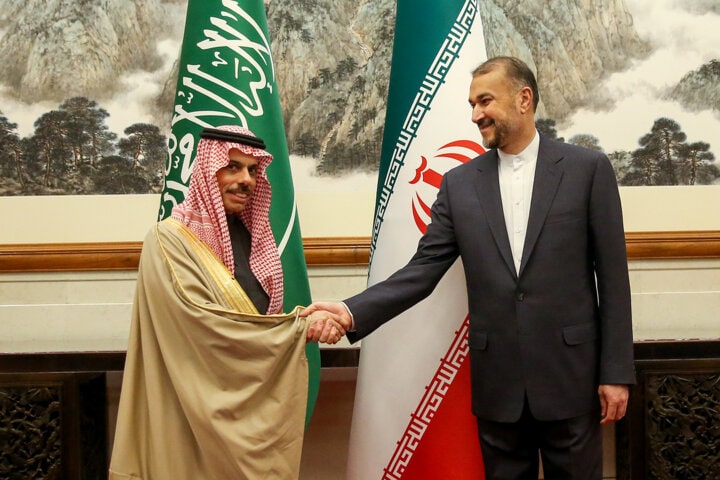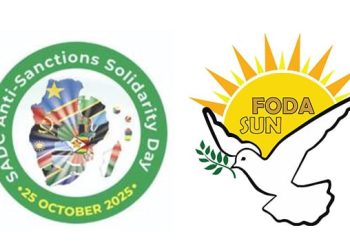Saudi Arabia and Iran agreed on 10 March 2023 to restore diplomatic relations as part of a Chinese-sponsored initiative that appears to be aimed at reducing tensions across the Middle East. Representatives of Iran and Saudi Arabia, who had been meeting secretly for five days in the Chinese capital Beijing, announced a Chinese-sponsored agreement to restore diplomatic relations between the two countries (Crisis Group, 2023, https://rb.gy/lstklb). Tensions between the regional rivals date back more than four decades, persisting at lower levels than an initial period of de-escalation in the 1990s and then escalating over the past two decades. Riyadh officially cut ties with Tehran seven years ago. Iraq and Oman hosted previous rounds of negotiations between Iranian and Saudi officials, But the role of China in the formation of the agreement and the speed of this agreement were not predicted. The joint tripartite statement issued by the three countries represents a geopolitical shift that will see China play a greater role in a region long dominated by the United States. It is expected that the closeness of Iran and Saudi Arabia will reduce the security concerns of the countries of the region, including the Arab countries of the Persian Gulf and countries such as Yemen, Iraq, Lebanon, and Syria.
Persian Gulf States
The agreement between Saudi Arabia and Iran provided a road map for re-establishing diplomatic relations within two months. This agreement can reduce the intense hostility between the two countries for a decade. Currently, the implementation of the agreement appears to be proceeding at a fast pace. Saudi Arabia’s King Salman invited late Iranian President Ibrahim Raisi to Riyadh (BBC, 2023, https://rb.gy/405qrr) and the two countries’ foreign ministers met in Beijing on April 6. A senior Saudi official said that Riyadh “wants to focus on the momentum resulting from the success of the Beijing negotiations”; While the Saudi finance minister announced that the country is ready to start investing in Iran “very quickly” (Reuters, 2023, https://rb.gy/v37fnm). Both countries immediately sent technical delegations to prepare to reopen their embassies (Al-Jazeera, 2023, https://rb.gy/52hacs) and announced that the two-month timeline was on track. Beyond improving bilateral relations, this agreement may also help reduce tensions in the Persian Gulf region. Officials from the United Arab Emirates, Kuwait, and Oman all hailed the agreement as a move towards stability and prosperity that would benefit all parties. Even Bahrain welcomed the agreement by issuing a statement and expressing hope for resolving disputes through dialogue and diplomacy. Relations between the Arab countries of the Persian Gulf and Iran have improved significantly in the last two years. The most recent rift between Iran and these countries can be traced back to January 2016, when Iranian protesters took over the Saudi embassy in Tehran after Riyadh ordered the execution of Shiite cleric Nimr al-Nimr, a prominent opponent of the kingdom. Then all the Arab countries of the Persian Gulf (except Oman) reduced or severed their relations with Iran. In the following years, Oman, Qatar, and sometimes Kuwait continued to engage with Tehran even though tensions were high. In contrast, Saudi Arabia, the United Arab Emirates, and Bahrain supported former US President Donald Trump’s “maximum pressure” campaign, which included more than 1,500 new sanctions and bellicose rhetoric, all aimed at isolating and weakening Iran. Today, all Arab countries of the Persian Gulf have restored or intend to restore full diplomatic relations with Iran. Even Manama, which has long accused Tehran of fomenting unrest among Bahrain’s majority Shia population, has reportedly held bilateral talks with Iran in recent months (Amwaj Media, 2023, https://rb.gy/6n4ydq). Immediately after the announcement of the agreement between Iran and Saudi Arabia, Ali Shamkhani, the former secretary of Iran’s Supreme National Security Council, proposed to accelerate and expand relations between Iran and the UAE in a meeting with senior security and economic officials of the UAE (Reuters, 2023, https://shorturl.at/HCkmn).
There are clear steps that Iran and Saudi Arabia can take to demonstrate their commitment to non-interference, which both countries have reportedly agreed to as part of the deal. According to reports, Saudi Arabia has said that it will limit its support for media networks that work against Iran.
This agreement can also help to open the doors for security dialogue between the Arab countries of the Persian Gulf, Iran, and Iraq. Some of the smaller Arab states of Persian Gulf had previously been reticent about expanding their engagement with Tehran if Riyadh did not first mend ties, so in that sense, the deal opens the door to wider discussions. Such a dialogue could be a venue for states to discuss and develop ways to address their primary security concerns, particularly in the Persian Gulf itself. It might have a salutary impact on the war in Yemen and potentially even, over time, in other areas.
Yemen
The agreement between Saudi Arabia and Iran coincided with the 8th anniversary of the military intervention of the Saudi-led coalition in Yemen to overthrow the Iranian-backed Ansarullah group known as the Houthis. The campaign turned out to be an expensive failure for Saudi Arabia. It achieved neither of its declared goals – defeating the Houthis and restoring the government of Abd-Rabbu Mansour Hadi, the internationally recognized president whom the Houthis had chased out of the capital Sanaa. Today, the Houthis maintain a tight grip on the northern highlands, including Sanaa where most of the population resides.
Riyadh hopes that the agreement with Tehran will help maintain the momentum toward the withdrawal from Yemen that it is seeking. Both Saudi Arabia and Iran may see reconciliation in Yemen as the first step towards a regional security arrangement that benefits them.
An extension of the formal truce, which could then lead to a permanent ceasefire, would be an important first step. In an encouraging move, the Houthis and the government exchanged more than 800 prisoners between 14 and 17 April. Earlier in April, Saudi Arabia invited members of the Presidential Leadership Council, its main Yemeni partner, to discuss the details of a roadmap Riyadh has been negotiating with the Houthis.
Iraq
The agreement between Saudi Arabia and Iran has the potential to reduce tension in Iraq. Baghdad has been trying to bring its two neighbors together for some time. Iran has close religious, economic, and cultural relations with many Iraqi people. It also has significant political influence.
Iraqi Sunnis, by contrast, historically hold tribal, trade, and religious ties with Saudi Arabia. Riyadh has exercised the relatively little influence it wields in Iraq mainly through Sunni tribes as well as political parties that have been subordinate partners in post-2003 power-sharing governments.
To lower the temperature, Baghdad has undertaken efforts to reposition Iraq as an arena for regional dialogue rather than proxy confrontation. Various Iraqi politicians have called for better relations between Saudi Arabia and Iran. In particular, Mustafa al-Kadhimi, Iraq’s prime minister from 2020 to 2022, tapped the connections he acquired as former intelligence chief to bring Iranian and Saudi representatives to Baghdad for five rounds of direct talks during his tenure. Those negotiations were essential in clarifying both sides’ concerns and building a practice of regular dialogue that paved the way for the Beijing meeting. Under Prime Minister Mohammed Shia’ al-Sudani, Iraq has tried to cement its ties with Saudi Arabia. In late February, interior ministry officials from Saudi Arabia and Iraq signed a memorandum of understanding to strengthen security cooperation, and in January, Iraq’s southern city of Basra hosted the 25th Arab States of Persian Gulf Cup[1] football tournament, prompting an influx of Arab States of Persian Gulf visitors that the country had not experienced in years. A Saudi-Iranian détente may also remove political obstacles that have stood in the way of substantial Saudi investment in Iraq (Amwaj Media, 2022, https://shorturl.at/O059P).
Lebanon
The Saudi-Iranian rivalry has been a major, though far from the only, hurdle to forging a compromise in Lebanon that would allow the country’s political elites to meaningfully address the devastating crisis that has ravaged its economy since late 2019 when a broad protest movement erupted against the entire political class (Crisis Group, 2022, https://shorturl.at/WC3Ou).
Beijing’s agreement could eventually facilitate a resolution to Lebanon’s domestic crisis on terms favorable to them. At the same time, there is consensus that, at least for now, neither Iran nor Saudi Arabia will devote much attention to Lebanon compared with, for example, Yemen or Iraq.
Syria
The agreement between Iran and Saudi Arabia comes three years after the longest ceasefire in the Syrian civil war. It seems that the agreement between Iran and Saudi Arabia may accelerate the normalization of relations between Syria and some Arab states. These efforts, which Moscow has backed, had faltered on Damascus’ refusal to compromise on key issues, such as the safe return of refugees, accommodation of parts of the opposition, and refusal to remove Iranian and Hizbollah forces from Syria. But in the aftermath of the Chinese-brokered Saudi-Iranian agreement, Riyadh has signaled readiness to normalize relations with the Syrian regime unconditionally – a move that was much rumored beforehand but likely accelerated by the Beijing deal.
On 1 April, news broke that Syria was also in advanced talks with Egypt to restore diplomatic relations, as the two countries’ foreign ministers met in Cairo. Diplomatic normalization between Damascus and some Arab countries will initiate the resolution of the conflict.
- CRISIS GROUP (2023), How Beijing Helped Riyadh and Tehran Reach a Detente, Accessible at: https://rb.gy/lstklb
- BBC News (2023), Saudi Arabia invited Iran’s President Raisi to visit, Tehran says, Accessible at: https://rb.gy/405qrr
- Reuters (2023), Saudi Arabia could invest in Iran ‘very quickly’ after agreement – minister, Accessible at: https://rb.gy/v37fnm
- Aljazeera (2023), Iran’s Raisi welcomes invitation from king to visit Saudi Arabia, Accessible at: https://rb.gy/52hacs
- Amwaj Media (2023), Exclusive: Bahrain, Iran held ‘low-profile exchanges’ amid Iranian-Saudi détente, Accessible at: https://rb.gy/6n4ydq
- Reuters (2023), Iran’s top security official to visit the UAE amid regional rapprochement, Accessible at: https://shorturl.at/HCkmn
- Amwaj Media (2022), Will Saudi investment pledges in Iraq overcome barriers?, Accessible at: https://shorturl.at/O059P
- CRISIS GROUP (2022), Limiting the Damage of Lebanon’s Looming Presidential Vacuum, Accessible at: https://shorturl.at/WC3Ou
[1]. Also known as the “Arabian Gulf Cup”





